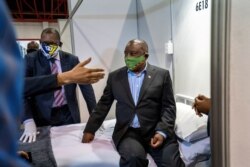South Africa, with the continent’s highest burden of COVID-19, has reached the peak of the pandemic, according to the president and top health officials. President Cyril Ramaphosa announced a loosening of restrictions but said that he is not yet breathing a sigh of relief.
A ray of hope for the Rainbow Nation, as the president announced that South Africa, with the continent’s heaviest known burden of the coronavirus, has passed its viral peak since reporting its first cases in early March.
President Cyril Ramaphosa, speaking late Saturday, said that over the past three weeks, the number of new confirmed cases has dropped from an daily average of about 12,000 to around 5,000 per day.
“A ray of light is visible now on the horizon," said Ramaphosa. "Let us continue to exercise the greatest caution and care and remain ever vigilant. Let us continue to stand united in our determination to defeat this virus.”
On the streets of Johannesburg Monday, residents had mixed feelings about the news. Robert Etzinger said while he was happy that the restrictions have eased, he wants more.
“I feel as though it's now lagging on too long. You know the rest of the economy needs to get back into the swing of things," said Etzinger. "The sooner we get over level two down to one, the sooner we can get the economy going and restart again. That's my feeling.”
The chair of South Africa’s advisory committee on COVID-19, Dr. Salim Abdool Karim, credits the government’s swift lockdown measures.
He says the government gained about 6 to 8 weeks of precious time to prepare by declaring a state of disaster, closing schools, banning international travel and banning the sales of alcohol and tobacco.
“The period where we are now, just past the peak of the epidemic, we have been seeing a slowing down in the number of cases, so that we are now between 4,000 and 5,000 cases a day," said Karim.
Ramaphosa also announced a loosening of restrictions, including allowing sales of tobacco and alcohol.
"Guided by the advice of our health experts and medical advisory committee, and after consultation with provincial and local government, Cabinet has decided to place the entire country on alert level 2, with effect from midnight on Monday, the 17th of August 2020," said Ramaphosa.
South Africa has at least 600,000 confirmed cases of COVID-19 in the nation of nearly 60 million.
It is also at the forefront of coronavirus prevention, with scientists at the University of the Witwatersrand this week launching the nation’s second vaccine trial. Karim says the nation’s long history with other pandemics has prepared it for this challenge.
“South Africa was able to build its capacity to undertake testing because of its TB and HIV epidemics," said Karim. "It’s the same technology. The problem has been in South Africa that we can’t buy enough test kits, because we are trying to buy the same test kits everyone else is trying to buy, and so we were constrained for a substantial period, in just not being able to get enough kits. As that problem has been solved, now we do have enough kits, we’ve been able to escalate our testing to around 40,000 to 50,000 tests per day.”
The COVID-19 peak may have passed, says Karim, but the danger of a second surge remains.
To that end, he urges South Africans to remain cautious.
Henry Ridgwell and Zaheer Cassim contributed to this report.
